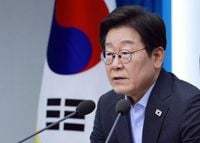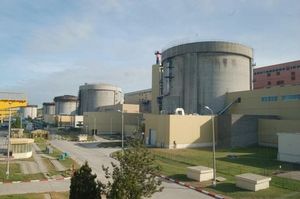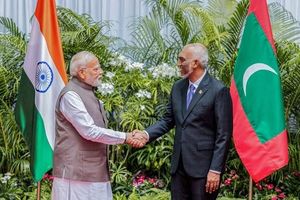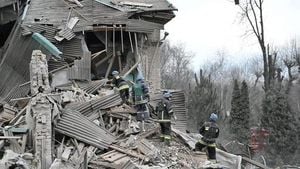A harrowing video revealing the mistreatment of a Sri Lankan migrant worker at a brick factory in Naju, South Jeolla Province, has ignited widespread outrage across South Korea, prompting a government investigation and a strong condemnation from President Lee Jae Myung. The footage, which surfaced publicly in late July 2025, shows the worker tied with white plastic sheeting and hoisted into the air by a forklift, an act that has been described as a blatant violation of human rights and a symbol of the systemic discrimination faced by migrant workers in the country.
The incident, which actually occurred on February 26, 2025, was captured in a 58-second video released by the Jeonnam Migrant Workers' Human Rights Network. In the clip, the worker is immobilized and suspended mid-air, bound to a load of bricks, while several co-workers laugh and film the degrading scene. One individual, speaking Korean, taunts the victim, demanding he admit fault. The forklift operator reportedly punished the worker—who had been employed for about three months under an E-9 visa—due to dissatisfaction with his ability to teach a fellow Sri Lankan how to wrap bricks properly.
Speaking to the JoongAng Ilbo, the worker recounted the trauma he continues to endure months after the incident. "The forklift operator caused me tremendous pain. The shock I felt back then still gives me headaches," he said. He described the humiliation as so severe that he no longer wishes to work in an environment where verbal abuse is commonplace. Despite the gravity of the assault, the factory has yet to issue a direct apology, offering only a public statement of regret.
The Jeonnam Migrant Workers' Human Rights Network held a press conference outside Naju City Hall on July 24, 2025, with the victim present, condemning the act as "shocking and unbelievable," emphasizing it as a symptom of deeply rooted structural discrimination against foreign laborers in South Korea. "This horrific violation of human rights is not a random outburst but the result of a culture of structural discrimination and violence against migrant workers deeply rooted in Korean society," the group stated. They highlighted the tragic irony that the victim was spending his birthday engulfed in fear rather than celebration.
President Lee Jae Myung took to Facebook to express his shock and dismay over the video, writing, "I couldn’t believe my eyes. I never imagined such abuse could happen in a democratic country and cultural powerhouse." He characterized the incident as an "inexcusable act of violence and a clear violation of human rights against a minority and vulnerable person." Lee pledged a firm response to prevent exploitation of migrant workers’ vulnerable status, equating the protection of their rights to the respect South Korea expects for its citizens working abroad.
During a Cabinet Council meeting, Lee reiterated his condemnation and underscored the impact such abuses have on South Korea’s international reputation. He ordered government ministries, including the Ministry of Employment and Labor, to conduct thorough investigations into working conditions for migrant and minority workers and to devise realistic measures to eradicate abuse. The president’s stance reflects growing awareness of the precarious position migrant workers occupy in South Korea’s labor market.
The Ministry of Employment and Labor responded swiftly, announcing a comprehensive inspection of the brick factory and a probe into any other instances of workplace violence, bullying, or unpaid wages. Minister Kim Young-hoon emphasized, "If any legal violations are found, we will respond strictly. We will also step up preventive inspections of workplaces that employ foreign workers to better protect their labor rights." The ministry’s commitment signals a heightened governmental focus on safeguarding migrant workers, who often face hazardous conditions and discrimination.
The factory in question employs about 20 workers, including several from Sri Lanka and East Timor, alongside South Koreans. Despite the controversy, the Sri Lankan victim reportedly continues to work there, a testament to the limited options many migrant laborers face. The factory’s management has described the incident as a "prank," a characterization strongly rejected by activists and human rights groups. Local officials and activists rallied at Naju City Hall, demanding accountability and justice for the victim.
Human rights experts have long warned about the vulnerabilities migrant workers face in South Korea. A 2024 report by the National Human Rights Commission highlighted a disturbing increase in workplace fatalities among migrant workers, rising from 7% to 12.2% between 2010 and 2019. The report also revealed that migrant workers are over three times more likely to die in industrial accidents compared to their South Korean counterparts. These statistics underscore systemic issues in workplace safety and labor rights enforcement.
The public reaction to the forklift incident reflects a broader reckoning with how migrant workers are treated in South Korea. Activists argue that such abuses are not isolated but indicative of a pervasive culture of neglect and discrimination. The victim’s experience, marked by physical pain and psychological trauma, has become a rallying point for calls to reform labor protections and combat xenophobia.
As South Korea grapples with its aging population and labor shortages, migrant workers play an increasingly vital role in the economy. Yet, their contributions are often overshadowed by stories of exploitation and abuse. The government’s response to this incident may set a precedent for how seriously it takes the rights and dignity of foreign workers moving forward.
For now, the Sri Lankan worker’s ordeal serves as a stark reminder of the challenges faced by migrant laborers in South Korea and the urgent need for systemic change to ensure their safety and respect.





